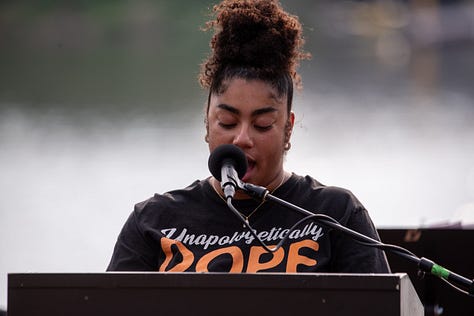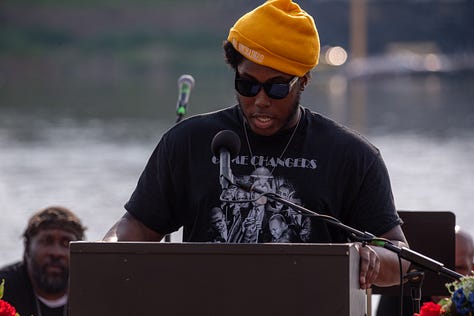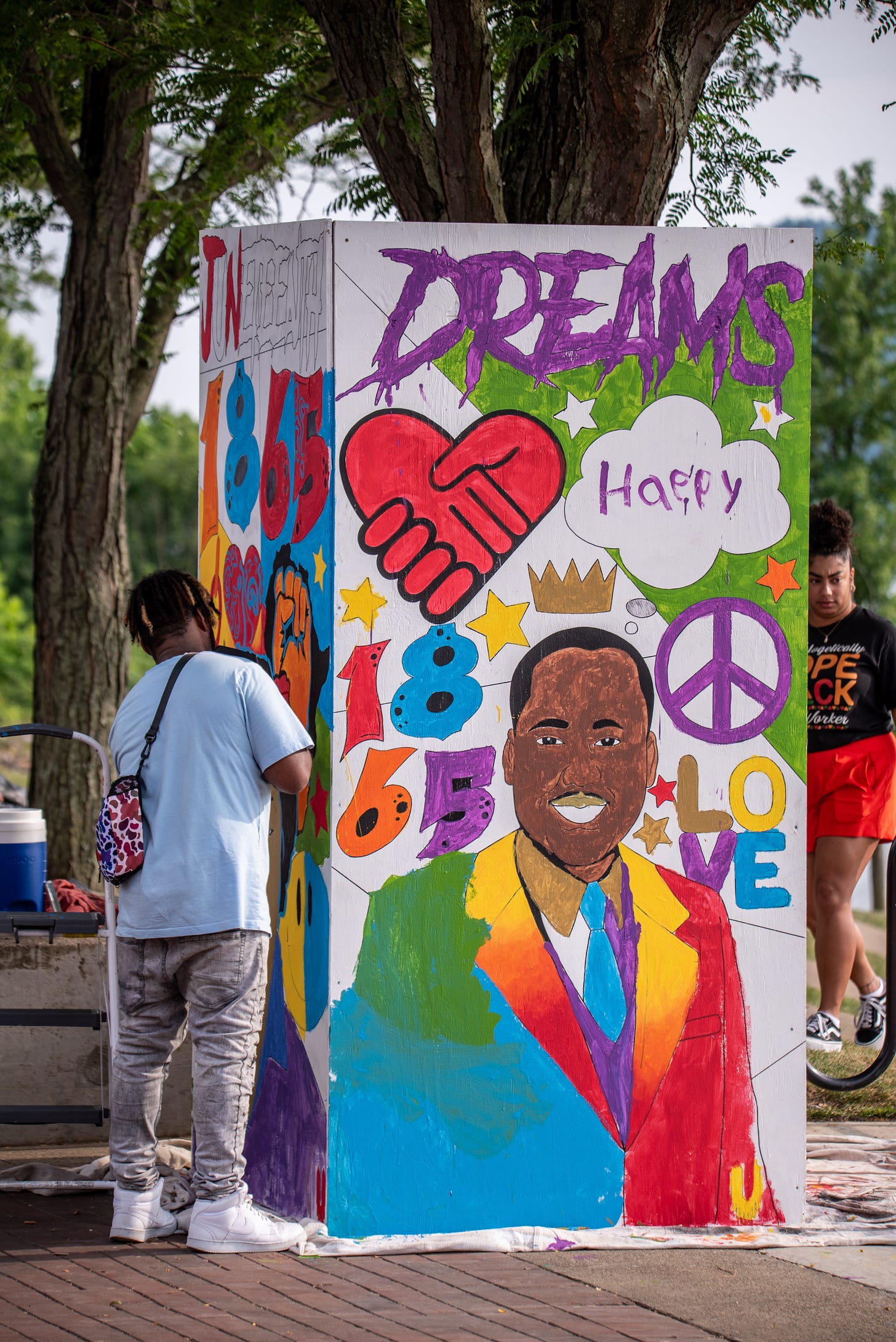LISTEN: Juneteenth speakers draw connections between past and present struggles for civil rights
Speakers, including the W. Va. NAACP president and a former state senator, encouraged attendees to remember the past and continue the struggle for freedom today.
WHEELING, W. Va. – The City of Wheeling commemorated Juneteenth for the sixth year in a row Wednesday at the Heritage Port. Past celebrations were held at the Market Street Plaza–the site of a slave auction block where Black people were sold alongside fruits, vegetables, and other items, in historic downtown Wheeling.
Wheeling officially recognized Juneteenth in 2019–two years before state and federal governments. This year differed from previous celebrations, though, as the event stretched from Saturday, June 15 through Wednesday, June 19. Events included a presentation by the Underground Railroad Museum in Flushing, Oh., on Saturday, a Soul Food Cook-off on Sunday, a special Ohio County Public Library ‘Lunch with Books’ event about the Hawk’s Nest Tunnel Disaster on Monday, a public mural painting on Tuesday, and the main event on Wednesday.
Juneteenth, or Juneteenth National Independence Day, honors the day when enslaved people in Galveston, Texas, in 1865, were informed that the civil war was over and that they were free–marking the last former Confederate state to have their enslaved population liberated.
This year’s Juneteenth theme was “We are our ancestor’s wildest dreams.” In essence, the meaning behind the year’s celebrations was to commemorate the success of Black communities in spite of slavery, failed reconstruction, and Jim Crow-era policies.

Ron Scott, Jr., the Cultural Diversity and Community Outreach Director for the YWCA in Wheeling and chair of the Juneteenth Committee, led Wednesday’s event and spoke to this reporter at the mural painting prior to Wednesday's celebrations.
Scott said the city's Juneteenth Committee tried to make the celebration a full weekend event. “We ended up having a series of really cool events that are not your average type thing,” Scott said. “And I think it’s a stuff that kind of screams ‘community collaboration.’”
Of those community collaboration events, the mural painting on Tuesday saw folks young and old come out despite record-breaking heat to decorate a four-panel mural inspired by Wheeling Heritage’s Alex Panas and designed by local artist Vondel Bell. “I thought it was just so genius,” Scott said of the mural. “It’s not just going to be Martin [Luther King, Jr.] and Rosa [Parks]. [Panas] added people from Wheeling so that folks understand that we got our own amount of history here in the inner city, too.”
The mural featured the Reverend Martin Luther King, Jr., and civil rights icon Rosa Parks, as well as Wheeling natives Leon “Chu” Berry–a legendary jazz saxophonist–and Ann Thomas–who in 1959 became the first Black person to become a registered nurse in the city after graduating from the Ohio Valley General Hospital school of nursing.
“We are just trying to add to the richness of what the entire country is, was, and could be,” Scott said of the Juneteenth celebrations.



And richness was, indeed, added throughout the events. Events on Wednesday saw speakers talk of their own history and their hopes for the future. Featured was a member of the Human Rights Commission, a comic book designer, a local nonprofit leader, president of the West Virginia. NAACP, a former state senator, and the current mayor of Wheeling, as well as music from singers at the historically Black Macedonia Baptist Church and musician Ezra Hamilton.

Darryl Clausell, president of the West Virginia NAACP, spoke about the ongoing struggle for freedom of all people and encouraged Americans to join forces in a united struggle. “The American struggle against slavery can never, ever, be forgotten,” Clausell said. “[It] serves us as the backbone for a culture of people to remember that this struggle continues even now.”
Claussell, just a day before West Virginia’s independence day ceremonies, noted that the “authentic Freedom Day” of the state falls on February 3, 1865–not June 20, 1863. “This day (February 3) commemorates the liberation of enslaved individuals in West Virginia, making a pivotal moment in the state’s history.”
Although West Virginia was admitted to the Union after rebelling against Confederate Virginia, the United States permitted the state to continue practicing slavery as the Emancipation Proclamation only covered states in open rebellion. On February 3, 1865, the State of West Virginia ratified the 13th Amendment to the Constitution abolishing the practice of slavery, except as punishment for a crime.
Claussell warned of simply “going through the motions” this Juneteenth. “Today, certain groups of people want to take America backward,” Claussell said. He noted the abolition of a woman’s right to an abortion in dozens of states as an example.
“Blacks have long been viewed as secondary citizens,” Claussell said. “We must stay aware of the rights we share as citizens to break the molds that are being set by the conservative fathers of today, or we may end up longing for another Juneteenth freedom again.”
“We must always be together in the same struggle as our ancestry to remain where we have come, and continue to move forward,” Claussell concluded. “Juneteenth is a celebration of awareness.”

Owens Brown, former state senator from the first district, looked towards the Ohio River as he began his remarks. “You know, being here instead of on the plaza (where the slave auction block memorial sits), it makes me think,” Brown said. “If I were a slave–if I knew freedom was only 300 yards away, would I have jumped in the river and tried to escape?”
Brown’s powerful words paid homage to the fact that West Virginia was a slave state while its western neighbor, Ohio, was a free state where some escaped enslaved people fled on their way to Canada along the underground railroad.
Reflecting on the history of slavery, and considering the event’s theme, Brown said, “I refused to be a victim. I am a victor!” Brown continued, saying those who survived the Middle Passage, slavery, Jim Crow, and what he called “Trump-ism” were victors, too.
“If you’re not awoke, you cannot see the future,” Brown told the crowd. “We must not allow the darkness of slavery to overshadow the bright promise of our future.”
He encouraged all people–”Black, white, brown, yellow, red, and all the other beautiful people of the rainbow”–to join together as a united people towards a common struggle. “We cannot move forward as a nation unless we all move forward as one people seeking the promise of a better future for all,” Brown said.
Brown echoed Claussell’s statements about a woman’s right to choose, saying the Supreme Court had taken away their freedoms. “It was only one time in history, and it was during slavery in this country, that another man had the power to determine what another person should do with their body,” Brown said.
Brown continued, linking Juneteenth with struggles throughout the nation and world saying “We must not turn our backs on our LGBTQ+ brothers and sisters…We, as human beings, should wake up and hear the cries of the thousands of babies buried alive in the rubble of Gaza and the Ukraine by governments that has determined them expendable.”

Men of Change’s Hayden Cook linked his own professional experiences with the theme, “We are our ancestor’s wildest dreams.” He told the crowd about accepting a job as a college professor and telling the human resources director he never dreamt of the job. “It was an honest moment of reflection,” Cook said. “The environment I grew up in didn’t have many people dreaming of becoming educators, electricians, or engineers.”
“Although I am not exceptional,” Cook said, “I am the exception and not the rule when it comes to being a Black male educator. We make up less than 2% of all teachers.”
Cook told a story from 1925 where, in Alabama, a Black community came together to build a school for their children. One man, a former slave and sharecropper at the time, apparently donated his life-savings of ten dollars to the project because he wanted to see the children of his grandchildren have a chance.
“The last hundred years since this story took place we still have much more to achieve,” Cook said. “The disparities in our education system can be disheartening, but they also present opportunities and hope. I’ve had the privilege of being an educator for the last 17 years and, in doing so, I hope I honor ancestors like the gentleman who gave it his all to provide opportunities for future generations.”

In what may be his last speech as mayor of Wheeling, Mayor Glenn Elliott closed out celebrations marking the fifth time he’s spoken at the Juneteenth celebrations. Reflecting on the first event in 2019, Elliott said he told the first Juneteenth committee he wanted to cover the good, bad, and ugly of the city. “And, to their great credit, they did just that.”
“There’s certainly nothing more ugly in our history than slavery,” Elliott said. He noted that Wheeling was never a major slave city itself, but acted as a hub for the continental slave trade due to the city’s prominence on the Ohio River.
Elliott spoke of the two years between the Emancipation Proclamation and the actual emancipation of enslaved people in America. “This delay between the promise of freedom…and the actual end of slavery is in many respect a harbinger of what was to come int he decades ahead in the quest for civil rights and racial justice, Elliott said.
“Even as we gather here today in harmony, we cannot celebrate a complete victory in our efforts to form a more perfect union,” Elliott said. “It is our collective responsibility to push and pull society [to Dr. Martin Luther King, Jr’s ‘mountaintop’] whatever ways we can.”
Elliott said this holiday is not about judgment or division, but rather a chance for white Americans to put themselves in the shoes of Black Americans. “It’s certainly not work–whatever that word means–nor is it erasing anyone’s history or shaming anyone else living today for sins committed more than a century ago,” Elliott said. “It is a very critical ingredient to healing the racial wounds that continue to beset this great nation.”



